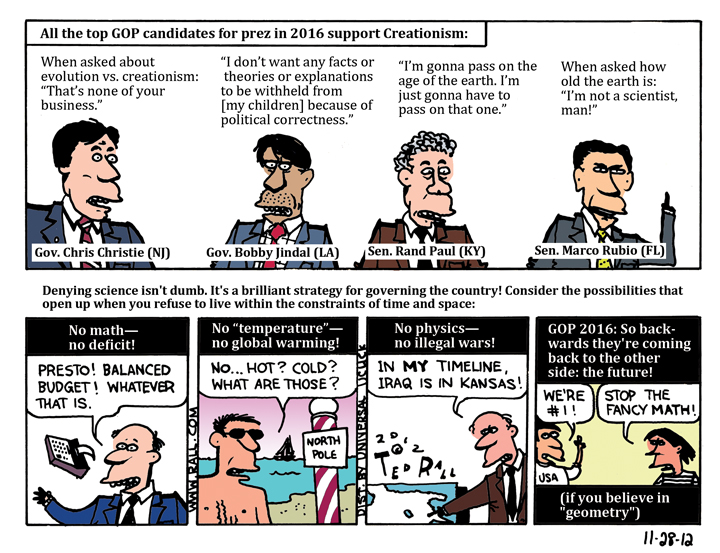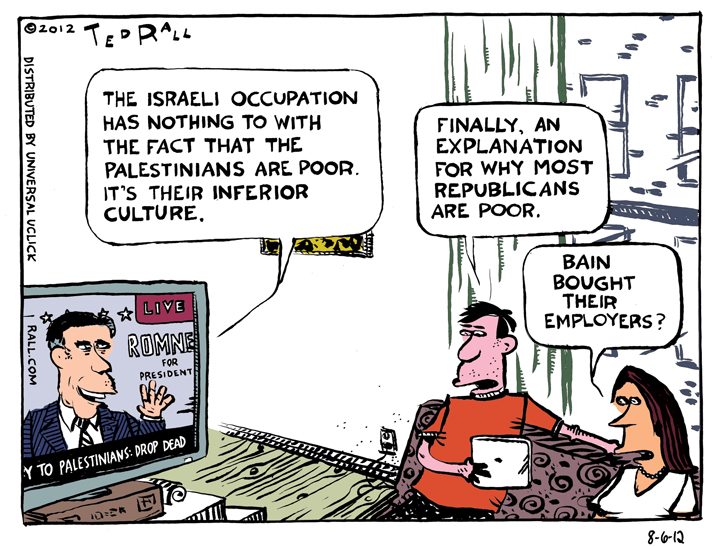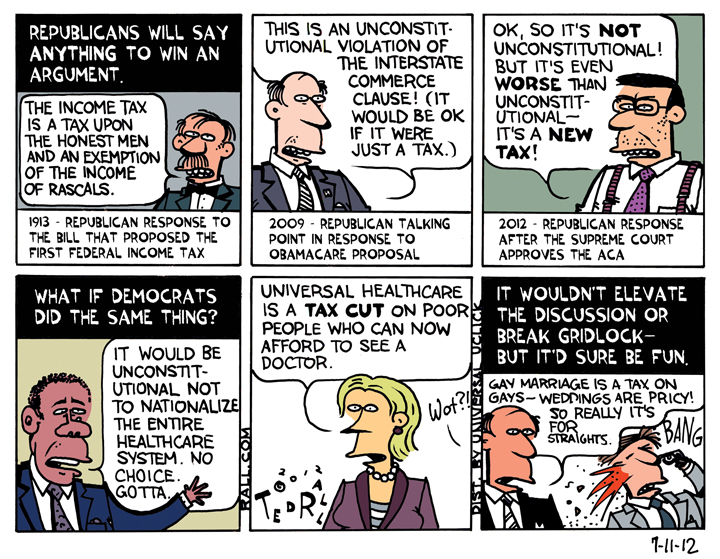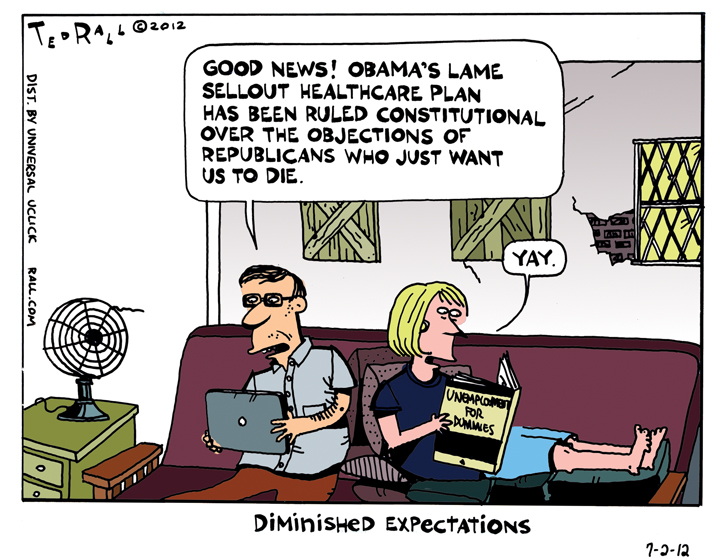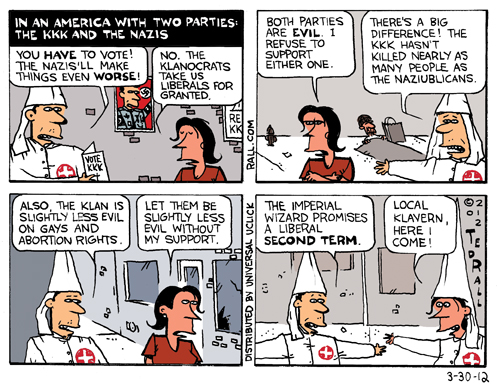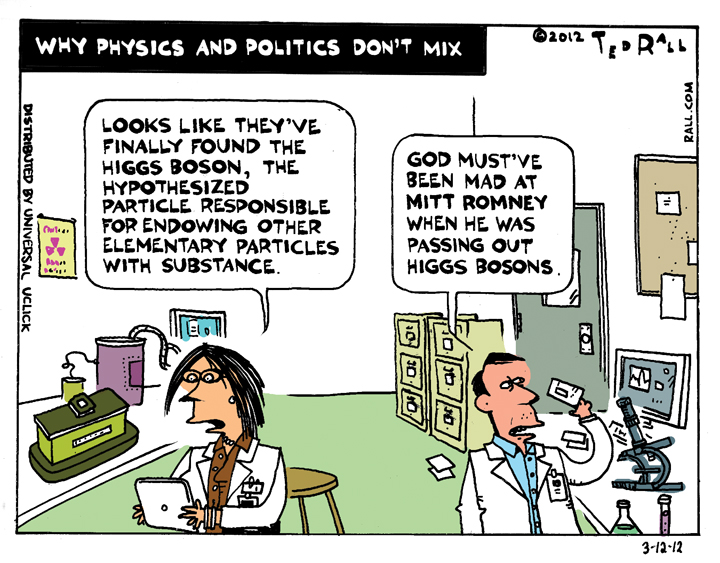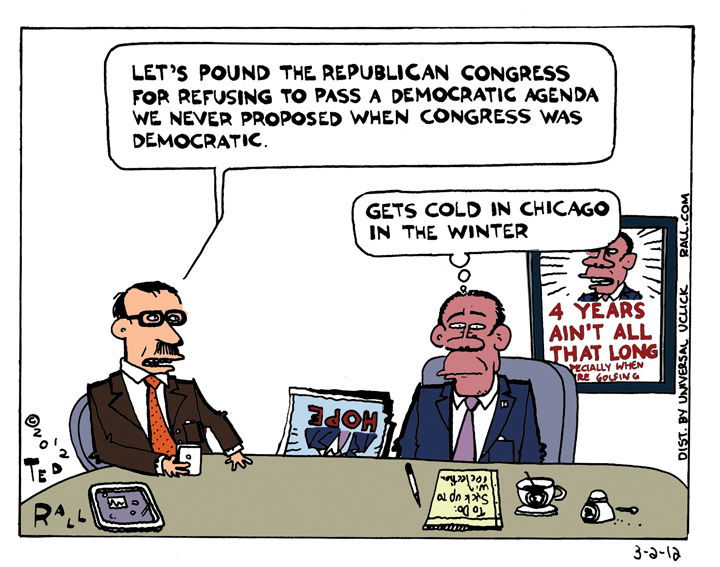Denying science isn’t dumb. It’s a brilliant strategy for governing the country! Consider the possibilities that open up when you refuse to live within the constraints of time and space.
SYNDICATED COLUMN: Our Contempt is Bipartisan
Both Zombie Parties Too Stubborn To Admit They’re Dead
Neither party gets it.
They both think they won. And they sort of did.
But we still hate them.
Democrats are patting themselves on the back, congratulating themselves for a mandate that neither exists–50.4% to 48.1% does not a mandate make–nor, if were real, would be actionable (Republicans still control the House). “Republicans need to have a serious talk with themselves, and they need to change,” Democratic columnist E.J. Dionne sniped in the Washington Post.
Not likely. If Republicans could change anything, it would be the weather. “If you hadn’t had the storm, there would have been more of a chance for the Romney campaign to talk about the deficit, the debt, the economy,” Karl Rove told the Post. (Which leaves out the fact that the places hit hardest by Hurricane Sandy, New York and New Jersey, are not GOP states.)
“We [Congressional Republicans] will have as much of a mandate as he [Obama] will,” claimed Speaker John Boehner.
The donkeys and the elephants think they’re awesome. Their plan to govern America for the next four years? Keep on keeping on. Why change?
Both parties are insane and self-delusional.
Voters are narrowly divided between the Ds and the Rs–because we can’t decide which one we hate most.
One out of three people think the two-party system is broken, and complain that neither party represents their political views.
A staggering number of people are boycotting quadrennial exercises in pseudodemocracy. Despite the advent of convenient early voting by mail, Election Day 2012 saw a “major plunge in turnout nationally” compared to 2008. About 42.5% of registered voters stayed home this year.
There were a substantial number of protest votes.
In one of the most ignored and interesting stories coming out of Election Day, one and a half million people voted for Libertarian Gary Johnson and Green Party candidate Jill Stein. Since Johnson and Stein were even more thoroughly censored than previous third-party candidates–Johnson and Stein were denied interviews on the major networks and locked out of the presidential debates–many of these votes must have been for “none of the above.”
Democrats didn’t win this election.
Neither did the Republicans.
Give the parties credit: They’ve united us in our contempt. Liberals and progressives hate the Democrats, which takes their votes for granted and ignores them. Conservatives hate the GOP for the same reasons. And moderates hate both parties because they don’t get along.
Who won? Not us.
Since the economy collapsed in 2008, Americans have made consistently clear what their number-one priority was: jobs. Yet the two major parties have focused on anything but.
The Tea Party convinced Republicans to campaign on paying down the national debt. Deficits, the debt and entitlements are important–but those problems are not nearly as urgent as unemployment and underemployment. When you’ve lost your job–as millions of Americans have since 2008–you need a new job now. Not next week. Not next year. NOW. You sure don’t need a job next decade–and that’s if you believe that austerity stimulates the economy. “Romney is not offering a plausible solution to the [unemployment] crisis,” Jonathan Chait wrote in New York magazine back in June. Romney never did.
And that’s why he lost.
Jobs were the #1 issue with voters, Obama never reduced unemployment and Romney had a credible narrative as a corporate turnaround expert. By all rights, Romney should have won. But he never delivered what voters wanted: a credible turnaround plan for the terrible jobs market–one with quick results.
Not that Obama and the Democrats have much to celebrate.
The president nearly lost to one of the worst challengers of all time, a bumbling, inarticulate Monopoly Man caricature of an evil capitalist. Democrats only picked up a few seats in Congress–this to a Republican Party whose platform on social issues was lifted from the Taliban, and whose major political figures included two rape apologists.
Like the GOP, Democrats paid lip service to the economy but never put forward a credible proposal that would have created millions of new jobs next week, not next decade. In 2009, while millions were losing their homes to foreclosure, Obama dwelled instead on healthcare reform. Like the deficits, the healthcare crisis is real and important–but it wasn’t nearly as urgent as the jobs catastrophe. Which, planted stories about fictional recoveries to the contrary, continues unabated.
Four years into an existential crisis that likely marks the final crisis of late-stage capitalism, an economic seizure of epic proportions that has impoverished tens of millions of Americans and driven many to suicide, the United States is governed by two parties that don’t have a clue about what we want or what we need.
Change? Not these guys. Not unless we force them to–or, better yet, get rid of them.
(Ted Rall‘s is the author of “The Book of Obama: How We Went From Hope and Change to the Age of Revolt.” His website is tedrall.com.)
COPYRIGHT 2012 TED RALL
SYNDICATED COLUMN: Why We’re Apathetic
Obama and Romney Ignore the #1 Issue
Don’t be apathetic, they tell us. If you don’t vote, you can’t complain. But how can people get excited about a political campaign that doesn’t address the issues we care about most?
Polls show that Americans are more concerned about the economy than any other issue. That has been the case since Obama became president in 2009.
Ignoring the elephant in the room, neither Obama nor Romney have put forth credible plans for getting the unemployed back to work or getting raises for those who still have jobs—and forget about underemployment. (In the long run, America’s biggest jobs problem isn’t that workers don’t have enough skills, but that millions are working beneath their level of intelligence and educational attainment.)
Obama says he inherited a mess. He’s right. His supporters say climbing out of the hole created by the 2008 meltdown and Bush’s deficit spending will take time. Which is true. But Obama never proposed a jobs program—so he can’t claim that Republican Congressional meanies blocked him.
Bizarrely, the President doesn’t explicitly promise that the economy will get better if we reelect him. His reelection campaign is mostly backwards looking, pointing to his achievements so far: healthcare, pulling out of Iraq, the assassination of Osama bin Laden, and his unpopular bailout of the big banks. On the economy, his overall approach has been to counsel patience, while hoping for things to improve.
Say this for Mitt Romney: he doesn’t share the president’s reticence. “If I become president, you’re going to see an economic resurgence: manufacturing resurgence, high-tech, health care. You’re going to see this economy take off,” Romney told supporters in New Jersey last month. “And I say that because I know what I’m going to do, and I know what kind of impact it will have.”
Romney’s ads strike the same can-do tone. “By day 100, President Romney’s leadership brings new certainty to our economy, and the promise of new banking and high-tech jobs.”
Whoa.
How will this kickass FDR-like miracle transpire? Romney has put forth what John Cassidy of The New Yorker calls a “ragtag collection of proposals—59 of them, ranging from eliminating the inheritance tax, to capping federal spending at twenty per cent of GDP, to opening up America’s energy reserves for development [which have been] widely dismissed as inadequate by his fellow Republicans.”
Trickle-down redux. Warmed-over drill-baby-drill
Sarahcuda. A dash of Steve Forbes (remember him?). In short: not so whoa.
If I were Romney I’d be proposing a conservative-based jobs-growth agenda—i.e., one that puts money into the pockets of business. Tax incentives for employers to hire new workers. Federal subsidies for job training programs. Higher payroll deductions for corporations. Capital gains tax cuts conditioned on funds being invested into projects that generate new jobs.
Romney could shore up his party’s nativist base by promising to build an impenetrable fence along the border with Mexico and to crack down on undocumented workers.
Thanks to the Republican Congress, it would be easy for Obama to make the case to voters that he’s trying to create jobs. He could propose something bold and grand, a new WPA that directly employs 20 million Americans building high-speed rail lines, new bridges and tunnels, teachers, artists, you name it. Best of all, it’s a promise he wouldn’t have to keep. The GOP would block it—turning them into the obstructionists Democrats portray them as.
Obama could also pursue small-bore approaches to the jobs problem, such a “first fired, first rehired” law that requires large employers to offer new jobs to their first layoff victims. The United States should join European countries, which don’t set arbitrary time limits on unemployment benefits. Layoff victims shouldn’t lose their homes; a federal program should cover their rent or mortgage payments until they get back on their feet.
Would these ideas fix the economy? Maybe not. But they would certainly go a long way toward reversing the current toxic state of electoral politics, in which the major parties float irrelevant wedge issues in their perennial battle over two or three percent of the vote in a handful of swing states, by engaging citizens in the process.
Will either party push forward a credible solution to the economic crisis? Probably not. Which is a reflection of the system’s inability to reform itself, and a harbinger of revolutionary change to come.
(Ted Rall’s new book is “The Book of Obama: How We Went From Hope and Change to the Age of Revolt.” His website is tedrall.com. This column originally appeared at NBCNews.com)
(C) 2012 TED RALL, ALL RIGHTS RESERVED.
Why Physics and Politics Don’t Mix
Scientists claim to have finally isolated the long-hypothesized Higgs Boson, a particular responsible for endowing other elementary particles with mass. Which gives us an opportunity to, as many editorial cartoonists do, blend two completely unrelated news stories into an awkward cartoon about contemporary politics.
SYNDICATED COLUMN: How To Talk To An Obama Voter (If You Must)
In 2012 Politics Is In The Streets—Not the Voting Booth
The Occupy movement is lying low. The Tea Party has been completely absorbed into the Republican Party—just another interest group. The only politics anyone talks about is the presidential horserace.
Don’t be fooled. This is temporary.
Spring will come. Robins will sing. The Occupations will return, bigger, energized and more militant. Don’t be surprised if movements more militant, further to the Left than Occupy, begin to emerge.
What passes for politics—Democrats, Republicans, vacuous debates over mini-issues (flag burning, taxes, deficits, gays) as the big issues go ignored (jobs, income inequality, militarism)—will be finally, totally and irreversibly exposed as the irrelevant, distracting farce they are.
Politics is about to move into the streets. Where they belong. Where they live in countries whose citizens are engaged in the fight over their destinies.
There will be primaries and party conventions and debates. All part of a ridiculous sideshow.
Get ready. 2012 is set to become our year of revolution.
No more will we outsource our lives to 435 oily white men in Washington and 50 random idiots in the state capitals. We will demand what is ours: freedom, dignity, equality, justice, fairness, decency. We will vote with the signs we hold. We will debate our neighbors in parks, cafes and bars. Our elections will be held in clouds of pepper spray, amid swinging batons and flying rocks.
It’s on.
Can you feel it?
Not everyone can. Maybe their instincts have been dulled. That’s OK. People are different.
People who don’t understand that everything has changed are gearing up for a presidential election. Obama versus Probably Romney. Should they vote? If so, for whom? Should they canvass/work the phones/donate to the corporate candidate of “their” choice?
We who feel it need those who don’t feel it at our sides. We who are ready to emancipate humankind, we who are challenging the monstrous hegemony of a corporate state with bottomless pockets and an endless capacity for violence can’t afford to have millions of intelligent, otherwise like-minded allies distracted, sucked into the vortex of electoral BS. We need everyone—including the Obamabots.
They’ve been programmed with talking points. Here’s how you counter them.
Obamabot Talking Point: If I don’t vote for Obama, the Even Worse Republicans win.
Answer: So vote for Obama. Or don’t vote. It makes no difference either way. Voting is like praying to God. It doesn’t hurt. Nor does it do any good. As with religion, the harm comes from the self-delusion of thinking you’re actually doing something. You’re not. Wanna save the world? Or just yourself? That, you’ll have to do outside, in the street.
In a second term, a reelected Obama who doesn’t have to worry about running again will be free to do cool liberal stuff.
Lame duck, anyone? Second-termers are weak. Look at previous presidents’ second terms: Bush 2005-2009, Clinton 1997-2001, Reagan 1985-1989, Nixon 1973-1974. Not much got done. Lots of scandals. Second-termers do worry about the next election; they want a successor from their party (typically their veep). Anyway, there is no evidence—none—that Obama ever wanted to do cool liberal stuff. He never promised any. Dude was a conservative Democrat all along. In a second term he’ll be a weak conservative Democrat so preoccupied trying to hand off the baton to Biden that he won’t float anything risky.
Lesser-evilism, yo. Gotta do whatever it takes so that Romney/Gingrich/Ron Paul doesn’t get in. Gimme those Obama totebags!
In the short run, this is a valid argument. If we were only considering this one election, it would make sense to get Obama in again. Anything to keep those crazy Republicans out.
Over the long term, however, lesser-evilism falls apart.
When the argument for every Democrat is that he’s not a Republican, when every Democrat who wins proves a disappointing imitation of the Republicans his supporters were supposedly voting against, when the net result is a string of alternating Democrats and Republicans who basically do the same thing, especially on the major issues, this election isn’t some special “let’s hold our nose this one time” but merely part of a rancid continuum that we should be opposing with all of our strength and energy—something we can’t do if we’re out pounding the pavement on behalf of a man who is oppressing us just as surely as his so-called “enemies.”
(Ted Rall is the author of “The Anti-American Manifesto.” His website is tedrall.com.)
COPYRIGHT 2011 TED RALL

